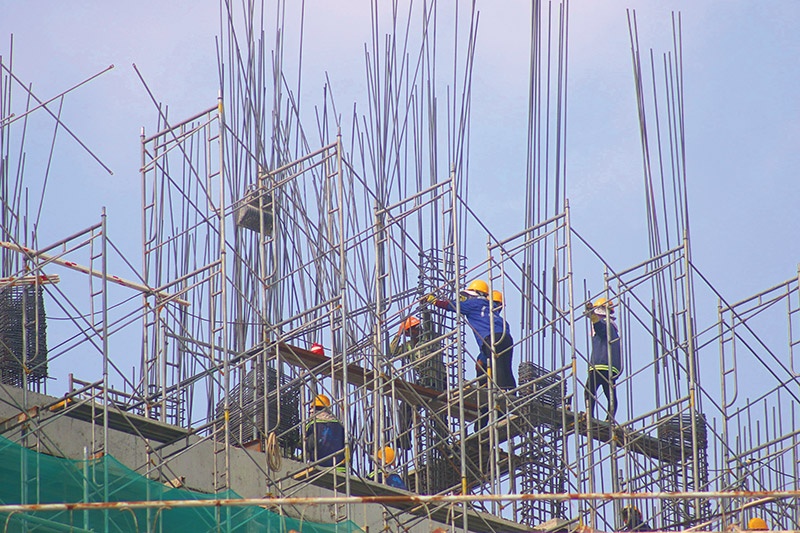Localities look to push key projects
 |
| Large-scale foreign-invested projects have failed to start construction due to a number of barriers. Photo: Le Toan |
Departments of planning and investment up and down the country are reviewing long-delayed projects and building up suitable solutions for each one, following the Ministry of Planning and Investment (MPI)’s request that people’s committees nationwide improve the quality of foreign direct investment (FDI) attraction and strengthen inspection and supervision.
Under a decision in late May, foreign-invested projects with registered capital of $100 million or more, those with a usable land area of 50 hectares or more, and initiatives in the real estate sector in Hanoi, Ho Chi Minh City, Danang, Haiphong, Khanh Hoa, and Ba Ria-Vung Tau are subject to the review.
The MPI requests licensing agencies to report on capital contribution and disbursement; the implementation of the objectives specified in the investment certificates; the land-use situation, and the observance of the provisions of the laws on land and construction.
However, according to a representative of Bac Lieu Department of Planning and Investment, it is difficult to resolve thoroughly ineffective investment projects due to many reasons. In some cases, the Mekong Delta province cannot support foreign investors to accelerate project process because it exceeds the sub-provincial authority.
He told VIR that the $4 billion LNG Bac Lieu venture invested by Singapore’s Delta Offshore Energy Pte., Ltd. is an example.
“The project was licensed in January 2020 and the investor expected to start the first-phase construction in January 2021 and finish in December 2023, meanwhile the remaining phase will come into commercial operation in December 2027. However, to date, the project still only exists on paper due to a number of barriers,” he said.
The representative said there are some procedures that depend on approval from central authorities, for example the feasibility study report appraisal and allocation of offshore area for the project. Besides that, the investor and Electricity of Vietnam are still in negotiations about a power purchase agreement.
The number of foreign-invested projects in Bac Lieu is modest, and the construction of many is behind schedule. For example, construction of the Bac Lieu wind power initiative from Thailand’s Super Wind Energy JSC kicked off in 2018 and was expected to be complete by 2021, but has yet to come into operation due to procedural barriers.
The Dong Hai 2 wind farm project is also behind schedule. Funded by U&I Advisory Service Vietnam Co., Ltd, the wind farm was licensed in March 2019 at $109 million. The project was due to start operations in April this year, but land clearance and other issues still have to be resolved.
The determination to resolve long-delayed projects is one of the commitments that leadership mentioned at the meetings of the people’s councils in many cities and provinces in recent days, such as Hanoi, the northern province of Hai Duong, and the central localities of Thanh Hoa and Danang.
Steven Bui, president of investment consultancy Delta E&C Japan, told VIR that the major reasons causing long delays are handovers of land to investors, administrative complications, and the financial weakness of some investors.
“In general, investors only decide to develop a project in Vietnam after calculating carefully because financial factors will impact on their business strategy. Delays like these are normally caused by the local governments rather than the investors,” Bui said. “When construction is delayed, it is difficult to define the responsibility of the two parties. In addition, the revocation of investment certificates is a major challenge.”
The consolidated figures of the Foreign Investment Agency under the MPI showed that as of June 20, there were almost 35,190 valid foreign-invested projects with the total registered capital of nearly $428 billion in the country. The disbursed capital reached almost $262 billion.
Numerous large-scale foreign-invested projects are lining up to complete procedures to be implemented. Examples include the Long An I and II LNG-fired power plants funded by VinaCapital GS Energy with the registered investment capital of $3 billion; and a $500 million solar photovoltaic cell factory by Jinko Solar Hongkong in the northeastern province of Quang Ninh licensed in late March 2021, among others.
“The government has established a task force to deal with challenges revolving around the disbursement of large-scale foreign-invested projects, which is expected to help problematic ventures push forward in implementation. Thus, the task force should take advantage to unleash thoroughly the role in pumping up project efficiency,” Bui said.
What the stars mean:
★ Poor ★ ★ Promising ★★★ Good ★★★★ Very good ★★★★★ Exceptional
 Tag:
Tag:
Related Contents
Latest News
More News
- Vietnam, New Zealand seek level-up in ties (February 19, 2026 | 18:06)
- Untapped potential in relations with Indonesia (February 19, 2026 | 17:56)
- German strengths match Vietnamese aspirations (February 19, 2026 | 17:40)
- Kim Long Motor and AOJ Suzhou enter strategic partnership (February 16, 2026 | 13:27)
- Haiphong welcomes long-term Euro investment (February 16, 2026 | 11:31)
- VIFC in Ho Chi Minh City officially launches (February 12, 2026 | 09:00)
- Norfund invests $4 million in Vietnam plastics recycling (February 11, 2026 | 11:51)
- Marico buys 75 per cent of Vietnam skincare startup Skinetiq (February 10, 2026 | 14:44)
- SCIC general director meets with Oman Investment Authority (February 10, 2026 | 14:14)
- G42 and Vietnamese consortium to build national AI infrastructure (February 09, 2026 | 17:32)






















 Mobile Version
Mobile Version